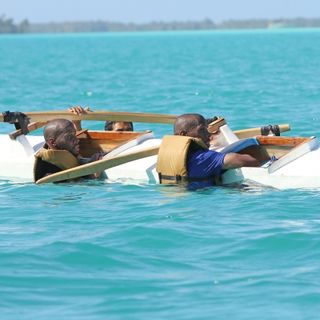
Water Health Safety Tips – Staying Healthy In The Water (Dr. J and Dr. I on The Amazing Race)
Whether spending time in a pool, a river, a lake, a stream or an ocean; many vacations include some form of water related activities. While spending time in the water can be fun, relaxing and refreshing; it can under certain circumstances also lead to avoidable illnesses that can really put a damper on a vacation. You can however decrease the likelihood that you will become the victim of a recreational water illness (RWI) by considering these water health safety tips.
1 – Never swim alone. Drowning is the 3rd leading cause of death resulting from unintentional injury worldwide and many drowning occur when victims are swimming alone.
2 – Read and adhere to all posted warning signs.
3 – Avoid swimming in a thunder storm. Water strongly attracts and conducts electricity and swimming during a thunderstorm increases the chances that you will be struck by lightening.
4 – Do not dive head first into murky water. It is very difficult to accurately determine water’s depth when it is murky and diving head first into water that is more shallow than suspect increases the chances of suffering life threatening head and neck injuries.
5 – Make sure that you know the direction of all currents when swimming in rivers, lakes and oceans.
6 – Avoid swallowing pool, river, lake, stream and ocean water. Water in pools (even when they’ve been properly treated with Chlorine or Bromine), rivers, lakes, streams and oceans frequently contains bacteria, viruses and parasites. These germs if swallowed can cause a wicked case of nausea, vomiting and diarrhea.
7 – Use ear plugs when swimming. Ear plugs help to prevent potentially contaminated water from collecting in your ear canals. If contaminated water collects and sits in the ear canals for a prolonged period of time infection of the skin of the ear canal(s), known as Otitis Externa or “Swimmers Ear” can develop.
8 – Swimmers Ear can be treated with an ear drop that combines a steroid and an antibiotic (normally a aminoglycoside or a fluoroquinolone).The steroid helps to decease the inflammation that occurs with the infection and that causes LOTS of pain while the antibiotic helps to kill the bacteria responsible.
9 – When using a hot tub never remain in the hot tub for more than 15 minutes. Additionally avoid a hot tub altogether if;
- You have been drinking alcohol, as the combination of the tub’s heat and alcohol can lead to an unstable blood pressure and cause of loss of consciousness.
- The hot tub water temperature is greater than 104F.
- The water has a strong chemical smell. A strong Chlorine or Bromine smell often times indicates a maintenance problem rather than a clean hot tub.
- The hot tub floor/tiles are sticky or slippery. A sticky or slippery floor and/or tiles often times results from a buildup of bacteria and can indicate that the hot tub has been infrequently or improperly cleaned.

 June 15, 2017
June 15, 2017




 May 19, 2018
May 19, 2018 




